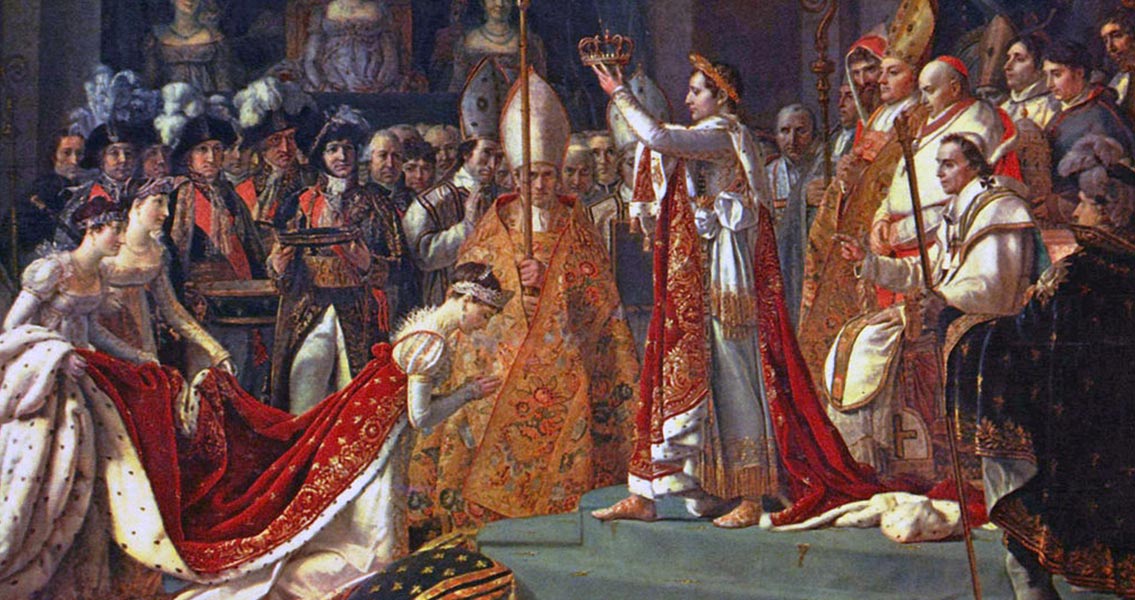<![CDATA[On December 2nd 1804, Napoleon Bonaparte crowned himself the emperor of France in the Notre-Damme Cathedral in Paris. The event marked the return of a monarchical institution to France, and a temporary end to the republicanism that had governed the country since the French Revolution. Unlike the sudden shock of the French Revolution, the realisation of Napoleon's dictatorial ambitions was the culmination of a process that had seen him becoming increasingly influential over a period of several years. He first started to come to prominence in the French Revolutionary Army of the late eighteenth century, where his abilities as an astute military strategist saw him quickly advancing through the ranks. By 1799, the fledgling French Republic found itself at war with most of Europe. Napoleon returned home from his Egyptian campaign a hero, and took control of the government to try and save France from internal and external dangers. He became First Consul in 1800, and immediately set about restructuring the French Army, leading to the successful defeat of Austrian forces. A sign of his increasing importance came in 1802, when he established a new French legal code. Despite his successes however, he found himself restricted by the complex, factional nature of French politics. He had courted the support of French Royalists, to cement and legitimise his power, at least publicly. This came to an abrupt end in 1804 with the execution of Louis Antoine de Bourbon, a relative of the Bourbon monarchs, for charges of conspiring with the British. The event seemed to inspire Napoleon. His reign up until then had seen the French Republic becoming increasingly dictatorial, in practice if not in appearance. Now, he felt confident enough to dispense with the illusion of democracy upheld by the Consulate. He proclaimed himself emperor on May 18th, 1804. Napoleon became the first French emperor for a thousand years, and from the start he seemed to revel in the pomp and heavy symbolism of the role. He invited Pope Pius VII to the lavish coronation ceremony, going as far as personally paying his travel expenses. Pius agreed, hoping to win the support of the new French emperor. Prior to the ceremony, it had been assumed the role of the Pope was to place the crown on the new emperor's head. Napoleon placed the crown on his own head however, reducing the head of the Catholic church to the role of a witness, rather than the actual giver of power. Napoleon also crowned his wife Josephine Empress of France. The two of them presided over a court of sophisticated etiquette and strict ritual. Napoleon started to live something of a double life. The public leader of a refined court, but also an obsessive planner and strategist, plotting military campaigns throughout Europe. One of the most surprising elements of the new France Napoleon was creating saw the return of an aristocracy to the country - the social institution that had been so viciously hunted down and all but destroyed fifteen years before. From 1808 he started to grant titles of nobility to those who had served him well. It reveals a lot about Napoleon's confidence, and his popularity in France, that he felt able to return so many marks of the old regime. By 1807, Napoleon had established an empire that stretched from the River Elbe down to Italy, and from the Dalmatian Coast to the Pyrenees. It would of course be short lived. In 1812 the French military started on what would prove a series of costly defeats, including a failed invasion of Russia and defeat at the Battle of Waterloo. Napoleon was eventually exiled to the island of St. Helena, off the coast of Africa. The former emperor lived there in comparative isolation compared to the grandeur of his court, eventually dying in May 1821. As for France, Napoleon's exile would eventually be followed by a return to a republican government in 1848. The empire Napoleon built was unable to survive for long without the presence of its founder.]]>
The Anniversary of Napoleon's Coronation
